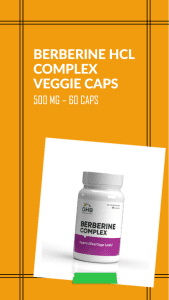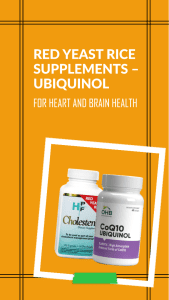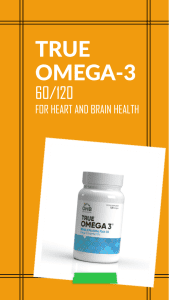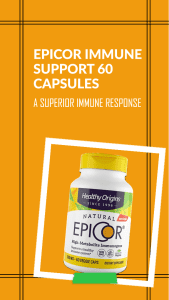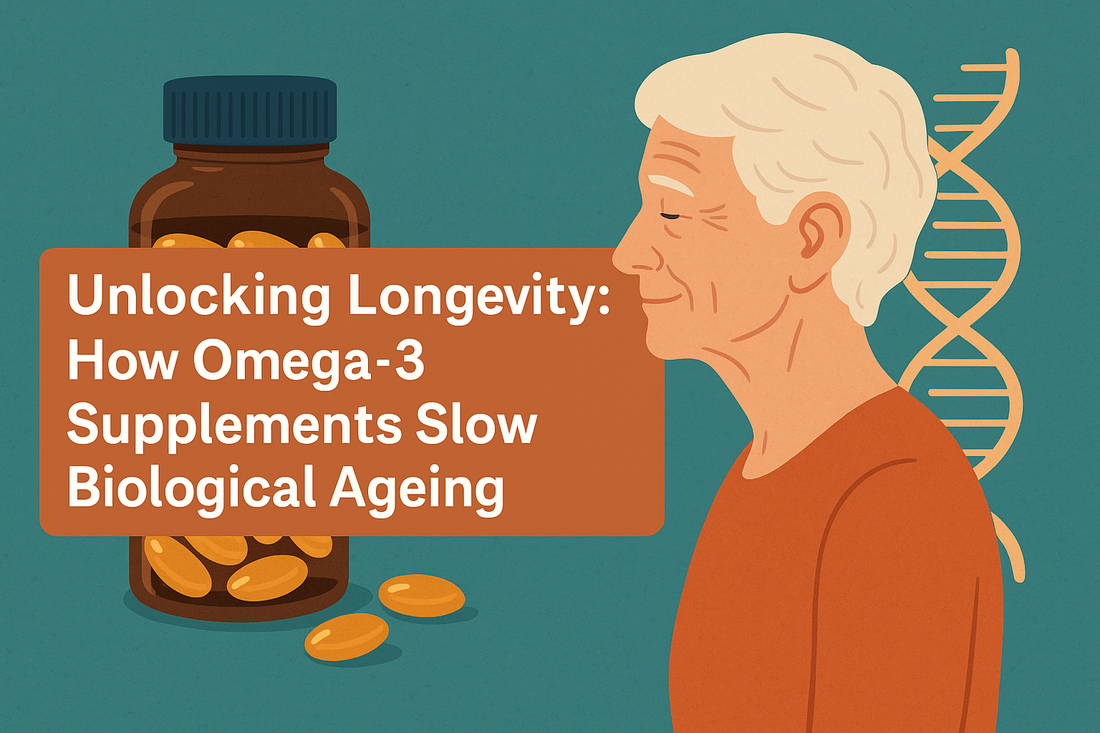
Share
Who doesn’t want to live a little longer—and do it while still able to touch their toes, remember where their keys are, and dance at a wedding? At Optimal Health Bridge, we believe living better for longer isn’t just a dream—it’s something you can plan for. And part of that plan includes a little superstar you might already know: Omega-3!
Today, let’s explore how Omega-3 might be your secret weapon against aging. But before we talk about fish oil and fancy science, let’s clear something up.
Biological Age vs. Chronological Age: What’s the Difference?
Your birth certificate might say you’re 50, but are your cells feeling more like 35—or more like 70?
Your chronological age is how many years you’ve been alive. Your biological age, though, is how your body is doing on the inside. It includes things like:
- Energy levels
- Cell health
- Risk of getting sick
- How well you handle stress
So, two people both aged 60 could feel very different. One may feel young and active, while the other may feel tired and slow.
10 Things That Speed Up Biological Aging
- Inflammation (that’s your body getting upset too often)
- Oxidative stress (free radicals damage cells)
- Shorter telomeres (they protect your DNA, and shorter ones mean older cells)
- Poor mitochondria function (those are your body’s energy makers)
- Hormonal imbalances (like too much stress hormone)
- Unhealthy eating habits
- Your genetics (family history counts)
- Toxins in the environment (like smoke or pollution)
- Not moving enough (too much sitting)
- Bad sleep (you need those Zzz’s!)
Now for some good news! Omega-3s can help fight many of those age-boosting problems.
What Are Omega-3 Fatty Acids?
Omega-3s aren’t robots or science fiction. They are healthy fats your body needs but can’t make by itself. That means you have to get them from food or supplements.
There are three main types of Omega-3s:
- EPA – helps reduce inflammation
- DHA – helps your brain and memory
- ALA – found in plants and needs to turn into EPA or DHA to work well
Where Can You Find Omega-3s?
- Fatty fish like salmon, sardines, and mackerel
- Flaxseeds and chia seeds
- Walnuts
- Algal oil (a plant-based option)
- Omega-3 supplements
Unless you eat fish often, chances are you could use more Omega-3 in your life.
How Omega-3s Help Slow Aging
Omega-3s do more than just help your heart. They can make a big difference in how young your body feels. Here’s how:
- Reduce inflammation – They help calm your body when it's overreacting.
- Strengthen cell walls – They keep your cells strong and working right.
- Boost energy – They help your cells make and use energy better.
- Fight damage – They protect your body from free radicals, which can harm your cells.
- Help your brain – DHA especially supports clear thinking and focus.
- Support your heart – They can lower blood pressure and improve cholesterol.
- Improve immune system – They help your body fight illness better.
- Keep telomeres long – That helps your cells stay younger longer.
- Help your skin – They keep it smooth, soft, and glowing.
- Lift your mood – They can help reduce sadness and worry.
10 Science-Backed Reasons to Take Omega-3s
Scientists have studied Omega-3s a lot, and the results are exciting. Check out what they’ve found:
- A study in JAMA showed people with higher Omega-3 levels had lower risk of dying from anything.
- UCSF researchers found that Omega-3s slow the shortening of telomeres, which helps keep cells young.
- Harvard studies link Omega-3s to a lower risk of deadly heart attacks.
- Older adults taking Omega-3s had better focus and memory over time.
- They may protect against vision loss as you get older.
- People with joint pain felt better and moved easier with Omega-3 supplements.
- They help improve sleep quality—sweet dreams!
- They lower signs of stress and damage inside the body.
- They help control blood sugar, which is good for people with or at risk of diabetes.
- People who took Omega-3s moved better and were even stronger (better grip strength!).
Choosing the Right Omega-3 Supplement
So now that Omega-3s sound amazing, how do you choose a good one?
You’re already in the right place! At Optimal Health Bridge, our Omega-3 supplements are:
- Sustainably sourced
- Purified to remove heavy metals
- High in both EPA and DHA
- Easy on the stomach (no fishy burps!)
Look for supplements that give you at least 1,000 mg of EPA and DHA combined each day. And always read the label carefully to make sure it’s quality you can trust.
Final Thoughts: Live Long and Take Your Omega-3s
Aging is natural, but feeling old doesn’t have to be. Omega-3 fatty acids are one of the best things you can take to help your body and mind stay young and strong.
They boost your brain, protect your heart, improve your mood, and even help your skin glow. So whether you want more energy, better memory, or fewer aches, Omega-3s could be your new best friend.
Just imagine yourself at 85—still dancing, solving puzzles, and enjoying life to the fullest!
Shop our trusted Omega-3 supplements today and start aging gracefully.
You're not getting older, you're getting better—especially with Omega-3s.
Did You Know?
Omega-3s used to be known just for heart health. Now, science shows they help with brain function, vision, skin, joints, and even your mood. They can’t teach you how to fold a fitted sheet—but they do just about everything else!
References
- Farzaneh-Far, R., Lin, J., Harris, W. S., et al. (2010). "Omega-3 fatty acid levels and telomere length in patients with coronary heart disease." JAMA.
- Harris, W. S., Miller, M., et al. (2009). "Omega-3 Fatty Acids and Coronary Heart Disease Risk." Current Atherosclerosis Reports.
- Yurko-Mauro, K., et al. (2010). "Beneficial effects of docosahexaenoic acid on cognition in age-related cognitive decline." Alzheimer's & Dementia.
Thanks for reading! Stay curious, stay healthy, and stay optimal.
— The Optimal Health Bridge Team

